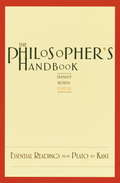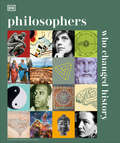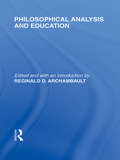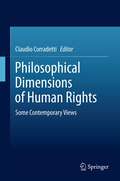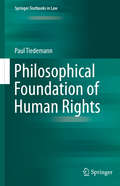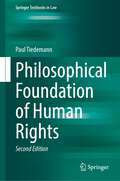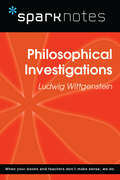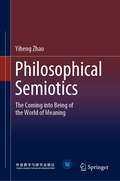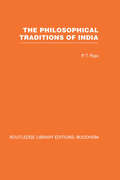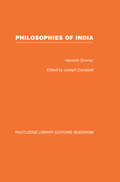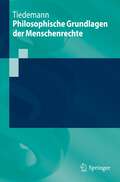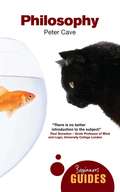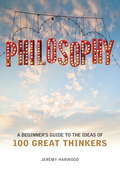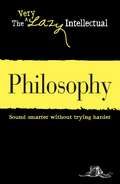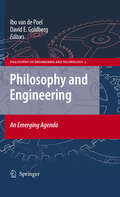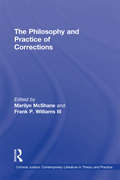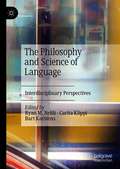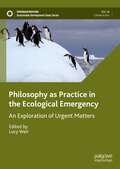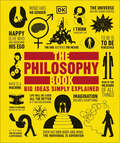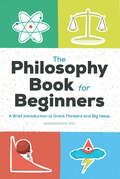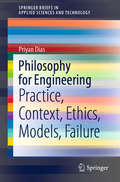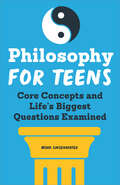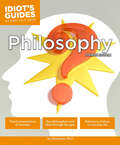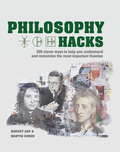- Table View
- List View
The Philosopher's Handbook: Essential Readings from Plato to Kant
by Stanley RosenAn ideal introduction for the casual reader and a beneficial reference for the student,The Philosopher's Handbookfeatures the writings of some of the world's most influential philosophers. Based on the premise that all human beings are curious about their existence, Rosen's collection brings together primary excerpts from the works of prominent thinkers such as Plato, Nietzsche, Descartes, Machiavelli, and Kant. Experts in each field have carefully selected the sources and provided brief introductions to help readers gain insight into the readings. Newly revised in order to emphasize its broad appeal,The Philosopher's Handbookis a solid introduction to Western philosophy for all inquiring minds.
Philosophers Who Changed History (DK History Changers)
by DKThis visual celebration of the world's most celebrated thinkers tells the fascinating stories of their lives and pioneering ideas.This book would be great if you are interested in philosophy, politics, history, and literature or would like to broaden your understanding of philosophy. Philosophers Who Changed History places well-known philosophers in their historical and cultural context, allowing you to see how they came to influence philosophy. In this edition, you can find: -An overview of the lives and works of around 80 of the world's most influential philosophers - from the Classical era to the present-Eight pages of brand-new content with 12 new entries, including Frederick Douglass and Luce Irigaray-Lavishly illustrated portraits of each philosopher, alongside photographs of their homes, studies, and personal artefactsEach philosopher is introduced with a realistic portrait and biographical entries which trace the friendships, loves, and rivalries that inspired and influenced them. Entries explore the key ideas and working methods of each individual and set their ideas in context, conveying a powerful sense of the place and the period of history in which they lived. Philosophers Who Changed History provides revealing insights into what drove each individual to develop new ways of understanding the world.
Philosophical Analysis and Education (International Library of the Philosophy of Education Volume 1)
by Reginald D. ArchambaultWhen originally published in 1965 this book reflected some of the new thinking among philosophers regarding the role of the discipline in its investigation of central issues in educaton. The essays are grouped into four major sections: The Nature and Function of Educational Theory; The Context of Educational Discussion; Conceptions of Teaching; and The Essence of Education. The concepts dealt with are of the first importance to any practical or theoretical discussion in education and the editor provides a generous introduction to the essays to aid the reader in his analysis of the issues.
Philosophical Dimensions of Human Rights
by Claudio CorradettiThis book presents a unique collection of the most relevant perspectives in contemporary human rights philosophy. Different intellectual traditions are brought together to explore some of the core postmodern issues challenging standard justifications. Widely accessible also to non experts, contributions aim at opening new perspectives on the state of the art of the philosophy of human rights. This makes this book particularly suitable to human rights experts as well as master and doctoral students. Further, while conceived in a uniform and homogeneous way, the book is internally organized around three central themes: an introduction to theories of rights and their relation to values; a set of contributions presenting some of the most influential contemporary strategies; and finally a number of articles evaluating those empirical challenges springing from the implementation of human rights. This specific set-up of the book provides readers with a stimulating presentation of a growing and interconnecting number of problems that post-natural law theories face today. While most of the contributions are new and specifically conceived for the present occasion, the volume includes also some recently published influential essays on rights, democracy and their political implementation.
Philosophical Foundation of Human Rights (Springer Textbooks in Law)
by Paul TiedemannThis textbook presents a range of classical philosophical approaches in order to show that they are unsuitable as a foundation for human rights. Only the conception of human dignity –based on the Kantian distinction between price and dignity – can provide a sufficient basis. The derivation of human rights from the principle of human dignity allows us to identify the most crucial characteristic of human rights, namely the protection of personhood. This in turn makes it possible (1) to distinguish between real moral human rights and spurious ones, (2) to assess the scope of protection for many codified human rights according to the criteria of “core” and “yard,” and (3) offers a point of departure for creating new, unwritten human rights. This philosophical basis supports a substantial reassessment of the case law on human rights, which will ultimately allow us to improve it with regard to legal certainty, clarity and cogency.The textbook is primarily intended for advanced law students who are interested in a deeper understanding of human rights. It is also suitable for humanities students, and for anyone in the political or social arena whose work involves human rights and their enforcement.Each chapter is divided into four parts: Abstracts, Lecture, Recommended Reading, and Questions to check reader comprehension. Sample answers are included at the end of the book.
Philosophical Foundation of Human Rights (Springer Textbooks in Law)
by Paul TiedemannThis textbook presents a range of classical philosophical approaches in order to show that they are unsuitable as a foundation for human rights. Only the conception of human dignity –based on the Kantian distinction between price and dignity – can provide a sufficient basis. The derivation of human rights from the principle of human dignity allows us to identify the most crucial characteristic of human rights, namely the protection of personhood. This in turn makes it possible (1) to distinguish between real moral human rights and spurious ones, (2) to assess the scope of protection for many codified human rights according to the criteria of “core” and “yard,” and (3) offers a point of departure for creating new, unwritten human rights. This philosophical basis supports a substantial reassessment of the case law on human rights, which will ultimately allow us to improve it with regard to legal certainty, clarity and cogency.In the second edition, errors have been corrected in numerous places, the text has been made clearer and easier to understand. In addition, more recent human rights issues have been newly included, especially those related to the Corona epidemic and climate change. The textbook is primarily intended for advanced law students who are interested in a deeper understanding of human rights. It is also suitable for humanities students, and for anyone in the political or social arena whose work involves human rights and their enforcement.Each chapter is divided into four parts: Abstracts, Lecture, Recommended Reading, and Questions to check reader comprehension. Sample answers are included at the end of the book.
Philosophical Investigations (SparkNotes Philosophy Guide)
by SparkNotesPhilosophical Investigations (SparkNotes Philosophy Guide) Making the reading experience fun! SparkNotes Philosophy Guides are one-stop guides to the great works of philosophy–masterpieces that stand at the foundations of Western thought. Inside each Philosophy Guide you&’ll find insightful overviews of great philosophical works of the Western world.
Philosophical Semiotics: The Coming into Being of the World of Meaning
by Yiheng ZhaoThis book attempts to solve the question whether semiotics is a methodology as is generally held and if the studies of meaning and the mind can shed light on a series of metaphysical issues, so that the edifice of semiotics could be erected on a philosophical ground. It proposes that a philosophical semiotics is, by necessity, a semiotic phenomenology about the construction of the “world of meaning” by signs, and any discussion about semiotics has to proceed around two core issues: meaning and the mind.This book particularly exemplifies the semiotic connections in various schools of traditional Chinese philosophies. In the “Pre-Imperial Age” (before BC 300), there emerged an abundance of semiotic thinking in China, from Yijing the first sign system that aims to explain everything in the world, to the Namists’s subtle argument about the form of meaning, from the Yin-Yang/five elements of the Han, to the “Things are non-existent while mind is non-non-existent” principle of the Vijñāptimātratāsiddhi School of Buddhism in the Tang, and from the Sudden Revelation of Chan Buddhism to the “Nothing outside the mind” endorsed by the Mindist Confucianism in the Ming. The mighty trend of philosophical heritage provides rich food to our understanding of the form of meaning.
The Philosophical Traditions of India (Routledge Library Editions: Buddhism)
by P T RajuThis volume conveys that Indian philosophy has intricate and complex metaphysical and epistemological theories as other philosophies and that these disciplines – epistemology and metaphysics – are an essential part of Indian philosophy.
Philosophies of India (Routledge Library Editions: Buddhism #9)
by Heinrich ZimmerOriginally published in 1973. The volume is divided into four sections: The introduction places the position of the Buddhist Tantras within Mahayana Buddhism and recalls their early literary history, especially the Guhyasamahatantra; the section also covers Buddhist Genesis and the Tantric tradition. The foundations of the Buddhist Tantras are discussed and the Tantric presentation of divinity; the preparation of disciples and the meaning of initiation; symbolism of the mandala-palace Tantric ritual and the twilight language. This section explores the Tantric teachings of the inner Zodiac and the fivefold ritual symbolism of passion. The bibliographical research contains an analysis of the Tantric section of the Kanjur exegesis and a selected Western Bibliography of the Buddhist Tantras with comments.
Philosophische Grundlagen der Menschenrechte (Springer-Lehrbuch)
by Paul TiedemannDieses Lehrbuch stellt zunächst eine Reihe von klassischen philosophischen Ansätzen vor, um zu zeigen, dass sie als Grundlage für die Menschenrechte ungeeignet sind. Nur das Konzept der Menschenwürde - basierend auf der kantischen Unterscheidung von Preis und Würde – ist als Grundlage geeignet. Die Ableitung der Menschenrechte aus dem Prinzip der Menschenwürde erlaubt es, das entscheidende Merkmal der Menschenrechte zu identifizieren, nämlich den Schutz der Personalität. Dies wiederum ermöglicht es, (1) die Menschenrechte sinnvoll zu interpretieren, (2) zwischen echten und unechten moralischen Menschenrechten zu unterscheiden, (3) den Schutzumfang vieler kodifizierter Menschenrechte nach den Kriterien „Kern“ und „Hof“ zu differenzieren und bietet (4) einen Ausgangspunkt für die „Entdeckung“ neuer, ungeschriebener Menschenrechte. Diese philosophische Grundlage ermöglicht eine grundlegende Neubewertung der Rechtsprechung zu den Menschenrechten, die es letztlich ermöglichen wird, sie im Hinblick auf Rechtssicherheit, Klarheit und Schlüssigkeit zu verbessern.Das Lehrbuch richtet sich in erster Linie an fortgeschrittene Studierende der Rechtswissenschaft, die an einem tieferen Verständnis der Menschenrechte interessiert sind. Es eignet sich aber auch für Studierende der Geisteswissenschaften und für alle, die im politischen oder sozialen Bereich tätig sind und sich mit Menschenrechten und deren Durchsetzung befassen.Jedes Kapitel ist in vier Teile gegliedert: Zusammenfassungen, Vorlesung, empfohlene Lektüre und Fragen, um das Verständnis des Lesers zu überprüfen. Musterantworten sind am Ende des Buches enthalten.
Philosophy: A Beginner's Guide (Beginner's Guides)
by Peter CavePhilosophy, the "love of wisdom", is the product of our endless fascination and curiosity about the world - the child of wonder. Through it, we seek to answer the most fundamental of questions: How do we know what we know? Does God exist? What is beauty? How should we live our lives? Who am I?In this exhilarating tour, Peter Cave navigates all the main topics in the subject with verve and clarity, from political philosophy to existentialism. Using witty and whimsical examples, including stoical sofas and Reg, the "regular" human, who just happens to carry his brain in a rucksack, Cave provides a welcome antidote to the dry textbook and underscores philosophy's enduring relevance today. Interspersed with helpful textboxes and mini biographies of the key thinkers, there is no better introduction for the aspiring sage.
Philosophy: A Beginner's Guide to the Ideas of 100 Great Thinkers
by Jeremy HarwoodFrom philosophy's founding fathers like Thales, Socrates, and Plato to great minds of the post-modern era like Sartre, Ayer, and Feyerabend, this essential guide distills the thoughts of the world's most influential minds and explains their answers to some of philosophy's key questions. Is there a Supreme Being? Who am I? What is truth? Do we have free will? Why do bad things happen? How should we live? Is death the end of everything? What is the meaning of life?Arranged from the ancient world to the present day, each philosopher's key ideas, notable works and pronouncements are encapsulated in a series of succinct , easy-to-read biographies, accompanied by illustrations, at-a-glance fact panels and thought-provoking quotations, making this the ideal beginner's guide for those wanting to get to grips with this fascinating but often daunting subject.
Philosophy
by Adams MediaDid you sleep through Intro to Philosophy? Does Plato leave you in the dark? Fear not! The Very Lazy Intellectual: Philosophy introduces you to both the major thinkers and the fundamentals of philosophical thought. With information on everyone from Socrates to Sartre, and theories from Epicureanism to Empiricism, you'll have everything you need to solve your existential crises in no time.
Philosophy: Sound smarter without trying harder
by Adams MediaDid you sleep through Intro to Philosophy? Does Plato leave you in the dark? Fear not! The Very Lazy Intellectual: Philosophy introduces you to both the major thinkers and the fundamentals of philosophical thought. With information on everyone from Socrates to Sartre, and theories from Epicureanism to Empiricism, you’ll have everything you need to solve your existential crises in no time.
Philosophy and Engineering: An Emerging Agenda
by Ibo van de Poel David E. GoldbergWhereas science, technology, and medicine have all called forth dedicated philosophical investigations, a fourth major contributor to the technoscientific world in which we all live - that is, engineering - has been accorded almost none of the philosophical attention it deserves. This volume thus offers a first characterisation of this important new field, by some of the primary philosophers and ethicists interested in engineering and leading engineers interested in philosophical reflections. The volume deals with such questions as: What is engineering? In what respect does engineering differ from science? What ethical problems does engineering raise? By what ethical principles are engineers guided? How do engineers themselves conceive of their profession? What do they see as the main philosophical challenges confronting them in the 21st century? The authors respond to these and other questions from philosophical and engineering view points and so illustrate how together they can meet the challenges and realize the opportunities present in the necessary encounters between philosophy and engineering - encounters that are ever more important in an increasingly engineered world and its problematic futures.
The Philosophy and Practice of Corrections (Criminal Justice: Contemporary Literature in Theory and Practice #4)
by Marilyn McShane Frank P. Williams IIIPublished in 1997, The Philosophy and Practice of Corrections is a valuable contribution to the field of Sociology & Social Policy.
The Philosophy and Science of Language: Interdisciplinary Perspectives
by Ryan M. Nefdt Carita Klippi Bart KarstensThis volume brings together a diverse range of scholars to address important philosophical and interdisciplinary questions in the study of language. Linguistics throughout history has been a conduit to the study of the mind, brain, societal structure, literature and history itself. The epistemic and methodological transfer between the sciences and humanities in regards to linguistics has often been documented, but the underlying philosophical issues have not always been adequately addressed. With 15 original and interdisciplinary chapters, this volume therefore tackles vital questions relating to the philosophy, history, and theoretical interplay between the study of language and fields as varied as logic, physics, biology, classical philology and neuroscience. With a four part structure, questions of the mathematical foundations of linguistics, links to the natural sciences, cognitive implications and historical connections, take centre stage throughout the volume. The final chapters present research related to the linguistic connections between history, philosophy and the humanities more broadly. Advancing new avenues of research, this volume is exemplary in its treatment of diachronic and cross-disciplinary interaction, and will be of interest to all scholars interested in the study of language.
Philosophy as Practice in the Ecological Emergency: An Exploration of Urgent Matters (Sustainable Development Goals Series)
by Lucy WeirThis book argues that philosophy is as practical as plumbing and what we need right now is what philosophers can offer as philosophers to help us all, our species, and beyond, through this ecological emergency, this climate change, this anthropocene. This book is about the meaning and purpose of philosophy as a way of, a practice of, responding to the ecological emergency, which includes climate change, biodiversity loss, pollution, habitat destruction, and all the associated impacts that fragment, and threaten to create collapse, among the systems that created and sustain us. There are the related economic and social impacts, the fragmentation of communities and political ideologies through attitude polarisation, and the increasing threats to systems by those who seek to promote further exploitation at the expense of attempts to regain some system of cooperation and an attitude of compassion which is at the heart of our survival strategies as a species. Philosophy has always sought to address questions related both to our place in the universe, and to how to live, given our understanding of our place. Those of us committed to a philosophical life have used a range of metaphors and narratives to enlighten, and to exhort to action, those who would seek to understand what to do, how, and why. Philosophy has played a key role in helping us as a species to respond to the ecological emergency. What, then, is the practice of philosophy, given that we’re in an ecological emergency?This question is the thread, and it forms the framework for the dialogue that runs through the book.
The Philosophy Book (DK Big Ideas)
by DKGet to grips with the concepts that shaped the way we think about ethics, politics, and our place in the universe.Explaining the big ideas and groundbreaking theories of key philosophers clearly and simply, The Philosophy Book is the perfect one-stop guide to philosophy and the history of how we think. Untangling knotty theories and shedding light on abstract concepts, entries explore and explain each complex idea with easy-to-follow explanations and innovative visuals. Explore the history of philosophy, from ancient Greece and China to today, and find out how theories from over 2,000 years ago are still relevant to our modern lives. Follow the progression of human ideas and meet the world's most influential philosophers – from Plato and Confucius through René Descartes and Mary Wollstonecraft to Ludwig Wittgenstein and Judith Butler.Dive into this phenomenal philosophy book to discover:-An accessible guide to philosophy, covering every major school and movement throughout history.-The clear and detailed text explains the most groundbreaking philosophical concepts and theories ever devised, while bold illustrations and pull-out quotes bring each idea to life.-Fully revised and updated to cover any developments in the field over the last 5–10 years.-Biography and context boxes place each idea in its wider historical, cultural, and social context.Your Philosophical Questions, Simply ExplainedIf you thought it was difficult to learn philosophy and its many concepts, The Philosophy Book presents the key ideas in a clear layout. Find out what philosophers thought about the nature of reality and the fundamental questions we ask ourselves: What is the meaning of life? What is the Universe made of? And work your way through the different branches of philosophy, such as metaphysics and ethics, from ancient and modern thinkers.The Big Ideas SeriesWith millions of copies sold worldwide, The Philosophy Book is part of the award-winning Big Ideas series from DK. The series uses striking visuals and engaging writing, making big topics easy to understand.
The Philosophy Book for Beginners: A Brief Introduction to Great Thinkers and Big Ideas
by Sharon Kaye Ph.D.Explore big questions and understand complex philosophy Who are you? What is truly real? Is there such a thing as free will? If you have ever considered questions like these, that's philosophy. The Philosophy Book for Beginners breaks down the core concepts of both Eastern and Western philosophy in clear language that explains the most important people and ideas. You'll develop an understanding of the basic ideas and see your understanding of the world expand—no dense, academic texts required. The major branches—Explore the central questions of metaphysics, epistemology, logic, and axiology as you see how they changed over time. A wide range of thinkers—Discover the diverse perspectives of philosophers, from Socrates in the fifth century BCE to modern-day thinkers like Martha Nussbaum. Thought experiments—Each chapter focuses on a topic, like existentialism, stoicism, or radical faith, and ends with a related thought experiment for you to ponder. Gain a solid understanding of philosophy, with a book that makes it easy to grasp and relevant to the world today.
Philosophy for Engineering: Practice, Context, Ethics, Models, Failure (SpringerBriefs in Applied Sciences and Technology)
by Priyan DiasThis book highlights the unique need for philosophy among engineers, which stems from issues regarding their knowledge (epistemology), role or being (ontology) and influence (ethics). It discusses practice, context, ethics, models and failure as key aspects of engineering, and provides an easy but essential introduction to philosophy for engineers by presenting four key philosophers and linking them to these aspects: Karl Popper (failure), Thomas Kuhn (models), Michael Polanyi (practice & ethics) and Martin Heidegger (context & ethics). Popper, Kuhn and Polanyi are philosophers of science (epistemologists) who have challenged the view that science is a ‘cool, detached’ discipline, since it also depends on human imagination (Popper), consensus (Kuhn) and judgment plus artistry (Polanyi); factors that are central to engineering. Heidegger (an ontologist) critiqued technology on the one hand (ethics), but also stressed the importance of ‘doing’ over ‘knowing,’ thus ‘authenticating’ the highly pragmatic engineering profession. Science is the ‘core’ component of engineering, which is overlaid by a variety of heuristics . Practice-based knowledge can be formalized, with artificial intelligence (AI) offering a valuable tool for engineering, just as mathematics has done for science. The book also examines systems thinking in engineering. Featuring numerous diagrams, tables and examples throughout, the book is easily accessible to engineers.
Philosophy for Teens: Core Concepts and Life's Biggest Questions Examined
by Mark LinsenmayerExplore philosophy through thought-provoking questions for teens If you like to ask deep questions about the world around you, then you already think like a philosopher. This book presents philosophy through fascinating questions you may have already thought about, like: Can we prove the existence of a God? What are minds, really? How can we be sure about anything? Ponder all these ideas and many more as you learn core philosophy concepts and strengthen your critical thinking skills. What sets this book about philosophy for kids ages 12 to 16 apart: An introduction to philosophy—Discover the history of philosophy, what makes a question philosophical in nature, and how being a philosopher can benefit you. The six main branches—Find questions organized by their branch of philosophy: metaphysics, epistemology, ethics, logic, aesthetics, and political philosophy. Philosophy in practice—Learn which philosophers asked and answered each question, explore different sides of an argument, and apply philosophical concepts to real life. Ponder life's biggest questions with this teen-friendly choice in philosophy books.
Philosophy, Fourth Edition (Idiot's Guides)
by Jay StevensonA newly visual approach, this updated edition will include infographics, photos, and pull quotes to help reinforce learning of the subject of philosophy. Beginning with the pre-Socratics and Eastern philosophers, all of the major schools of thought are covered. Content includes religious philosophy, Renaissance humanism, enlightenment philosophers, idealism, existentialism, post-structuralism and post-modernism, and more.
Philosophy Hacks (Hacks)
by Robert Arp Martin CohenDiscover the simple way to understand and remember the most groundbreaking concepts in 3,000 years of philosophical thought. Each idea is broken down into three stages: 1/ The helicopter view, which gives you an introduction to the idea, and some context around it. 2/ The shortcut, which gives you the core elements of the theory, along with a range of examples that everyone can understand. 3/ The hack, which is a one-liner designed to stick in your memory and give you an instant grasp of the concept.From Pascal's Wager to Kant's categorical imperative, and from Camus's Existential Nihilism to Arendt's Banality of Evil, there are 100 concepts explained. The perfect introduction to philosophy, this is a great new way to learn about the most important philosophical ideas and concepts in a way that makes them easy to recall even months after reading the book.
